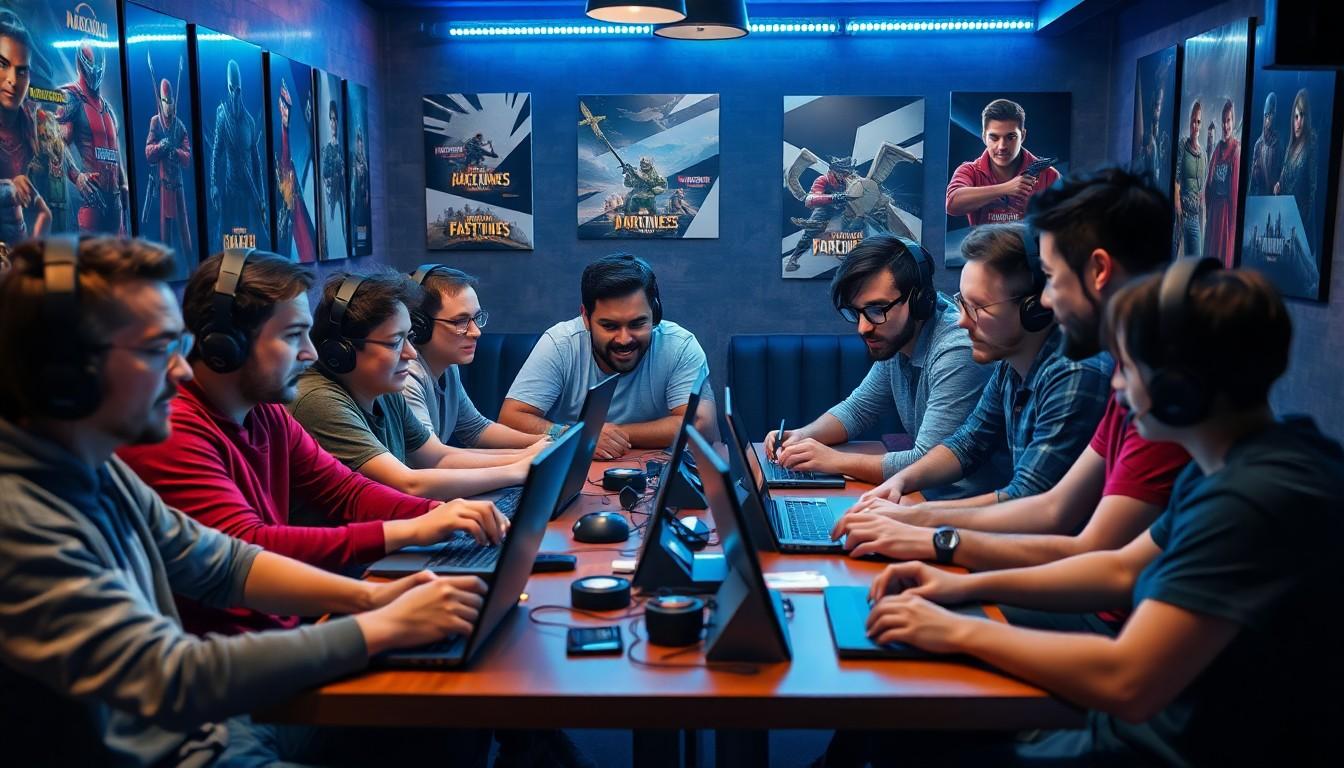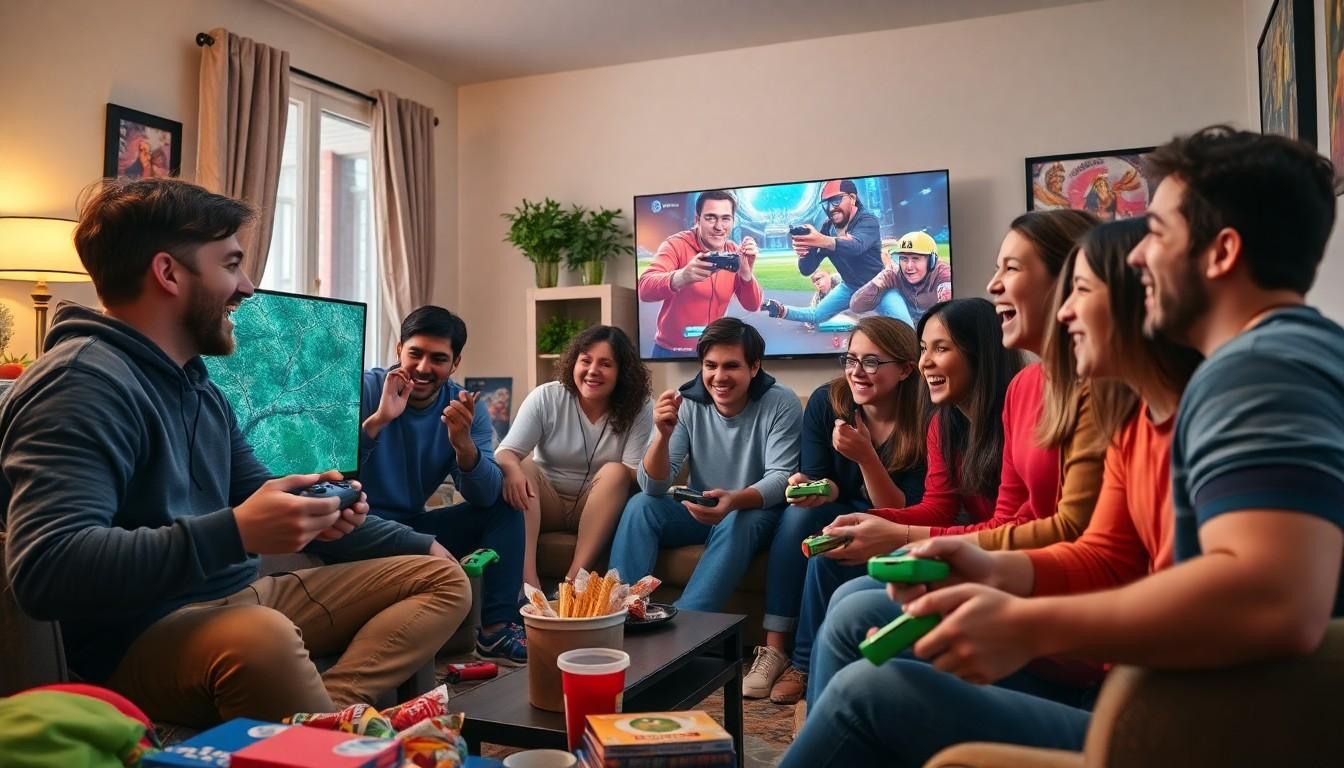In the vast universe of gaming, communities are the hidden gems that sparkle with camaraderie and creativity. These digital hangouts are where players unite, share tips, and answer burning questions faster than a speedrun. Whether it’s figuring out the best strategies for that impossible boss or debating the merits of pineapple on pizza, gaming communities have got it covered.
But what makes these communities tick? They’re not just about high scores and epic loot; they’re about connection, laughter, and sometimes, a little friendly rivalry. Dive into the world of gaming communities where answers flow like health potions and friendships are forged in the fires of online battles. Get ready to explore how these vibrant networks shape the gaming experience and why they’re essential for every gamer looking to level up their skills and social life.
Gaming Communities Answers
Gaming communities encompass groups formed by players who share interests, experiences, and passions in video games. These communities enhance social interactions and provide spaces for camaraderie and creativity.
Definition and Importance
Gaming communities consist of players engaging in discussions, sharing strategies, and answering questions. They foster a sense of belonging and offer various resources, which aid in skill development. Strengthening relationships among players often leads to collaboration in gameplay. Additionally, these communities serve as platforms for discovering new games and trends. Active participation can elevate the overall gaming experience by providing feedback and support.
Types of Gaming Communities
Numerous types of gaming communities exist, each catering to different interests. Online forums allow players to discuss specific games, while social media groups facilitate real-time interactions. Discord servers serve as real-time communication platforms, connecting players instantly. Competitive gaming communities focus on tournaments and skill improvement. Casual gaming groups foster relaxed interactions, emphasizing fun over competition. Content creation communities build around streaming or game-specific content, encouraging creativity and collaboration among members.
Common Questions in Gaming Communities

Gaming communities often focus on two main topics: gameplay strategies and technical issues. These discussions create avenues for players to share valuable insights and solutions.
Gameplay Strategies
Gaming communities frequently address tactics that enhance player performance. Members often inquire about effective character builds or weapon choices in popular games. Players share tips on map awareness, which drives better decision-making during matches. Group discussions might emphasize the need for teamwork and communication skills. Strategies for different game modes provide insight into diverse approaches. Feedback from seasoned players can elevate novice skills substantially.
Technical Issues
Technical difficulties often arise in gaming, prompting many community queries. Players may ask for help with specific error messages or connection problems. Knowledgeable members usually respond with step-by-step troubleshooting advice. Topics range from system requirements to graphic settings optimization. Others might discuss software conflicts or the need for driver updates. Players benefit greatly from shared experiences with hardware issues, leading to smoother gaming sessions.
The Role of Forums and Social Media
Forums and social media play crucial roles in connecting players within gaming communities. These platforms serve as hubs for conversation, allowing individuals to exchange insights and experiences.
Popular Platforms for Gaming Discussions
Reddit ranks high among platforms for gaming discussions, with dedicated subreddits focusing on specific games or genres. Discord provides real-time communication options through voice and text channels, fostering immediate engagement. Facebook groups also facilitate discussions, enabling members to share links and host events. Twitter allows players to follow trends and connect with developers directly, enhancing community interaction. Twitch serves not just as a streaming service but also as a platform for gamers to engage through chat and interactions during live broadcasts.
Impact on Community Engagement
Forums and social media drive engagement by promoting active participation among members. They enable users to ask questions and receive feedback quickly, enhancing the learning experience. Gamers often bond over shared interests, which strengthens relationships within these communities. Players can host events, like tournaments, to bring members together, increasing camaraderie. Sharing content such as gameplay clips or tutorials provides opportunities for recognition and feedback. Collectively, these interactions contribute to a vibrant community culture that encourages ongoing participation and improvement.
Challenges Faced by Gaming Communities
Gaming communities encounter several significant challenges that affect their dynamics and user experience. These challenges can hinder positive interactions and the overall growth of these groups.
Toxicity and Harassment
Toxicity within gaming communities manifests through negative behavior and harassment directed at members. Gamers often experience hostility, including personal attacks and derogatory comments, especially in competitive environments. This atmosphere discourages participation and can lead to decreased engagement from newcomers. Many communities strive to implement moderation tools and guidelines to combat such behavior. Policies against harassment create a safer environment for all members, fostering healthy interactions. These measures help maintain a focus on collaboration and skill development, essential for community growth.
Misinformation and Reliability
Misinformation poses a serious threat to the integrity of gaming communities. Members frequently share unverified information regarding gameplay strategies or technical fixes, often leading to confusion and frustration. Many rely on credible sources for accurate guidance, making it imperative for communities to prioritize reliable content. Encouraging members to fact-check information before sharing can mitigate the spread of inaccuracies. Building a culture based on trust and verification strengthens community bonds while enhancing the overall gaming experience. Ultimately, fostering an informed community directly supports players’ development and enjoyment.
Gaming communities play a crucial role in shaping the experiences of players around the world. They not only provide a space for sharing knowledge and strategies but also foster a sense of belonging that enhances the overall gaming experience. By connecting players through various platforms, these communities promote collaboration and skill development, making gaming more enjoyable and rewarding.
Despite the challenges they face, such as toxicity and misinformation, many communities are taking proactive steps to create a positive environment. As players continue to engage with one another, the impact of these vibrant networks on the gaming landscape will only grow, paving the way for a more inclusive and supportive gaming culture.

